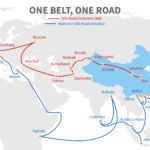Chinese cash abounds in Balkans – report
Reading Time: 2 minutesThe Balkans region of south-east Europe has attracted at least 135 China-linked projects worth at least EUR 32 billion in the last decade, according to a new report by the Balkan Investigative Reporting Network BIRN. In a wide-ranging investigation entitled “China in the Balkans: Controversy and Cost”, the outlet found that China is “taking over metallurgy, mining, energy, and transport”.
Serbia is “the main playground” having brought home at least 60 completed or ongoing collaborative projects worth at least EUR 18.6 billion with China since 2012, encompassing investments, loans, digitalisation and the security sector. China’s companies have invested or allocated over EUR 2 billion into 16 projects in Serbia, while the Chinese export-import bank has loaned at least EUR 5.7 billion. Although these have wrought significant negative environmental and social impacts, Serbian laws are regularly amended to meet the demands of China.
Serbia has also deepened relations with Huawei, despite inking a deal in Washington DC last September not to involve the Chinese tech company in its 5G network. Just one week later, Huawei opened an Innovations and Development Centre in the Serbian capital of Belgrade.
As BIRN’s report dropped on Thursday, EU lawmakers were passing a resolution regarding “modern slavery” in Serbia. MEPs voted 586 to 53 in favour of denouncing Chinese firms’ working conditions, and specifically Vietnamese imported workers at the Linglong tyre factory in Zrenjanin, northern Serbia. Last November a report by a Serbian NGO uncovered poor working conditions and disrespect of local employment laws at the plant, which the Serbian government denounced as an attack on the country, Euractiv reports. When the European Commission opened new EU accession chapters with Serbia last month, German Greens MEP Viola von Ramon-Taubadel urged the EU to instead show that the bloc “will not compromise its standards”.
Elsewhere in the region, Montenegro took out an EUR 800 million loan from China’s Exim Bank to finance 85% of a motorway section, ballooning its national debt to 103% of annual economic output. Regarding infrastructure and energy, China is most present in Republika Srpska in Bosnia and Herzegovina, where 18 of its 29 projects are in related sectors.
The results of China’s move into the post-Euro crisis Greece have been mixed. While BIRN lists 11 Chinese projects currently being implemented, 10 others have either failed or been cancelled. China has 64% control of the Piraeus Port via COSCO Shipping, for which it first paid EUR 280.5 million for a 51% stake in 2016.
North Macedonia has actively sought Chinese investment throughout the 21st Century, with the only fruits being the Miladinovci-Stip and Kicevo-Ohrid motorway construction projects, although the latter is behind schedule and remains incomplete. Unusually for the region, Albania saw a decline in Chinese investment over the last five years, BIRN notes.

